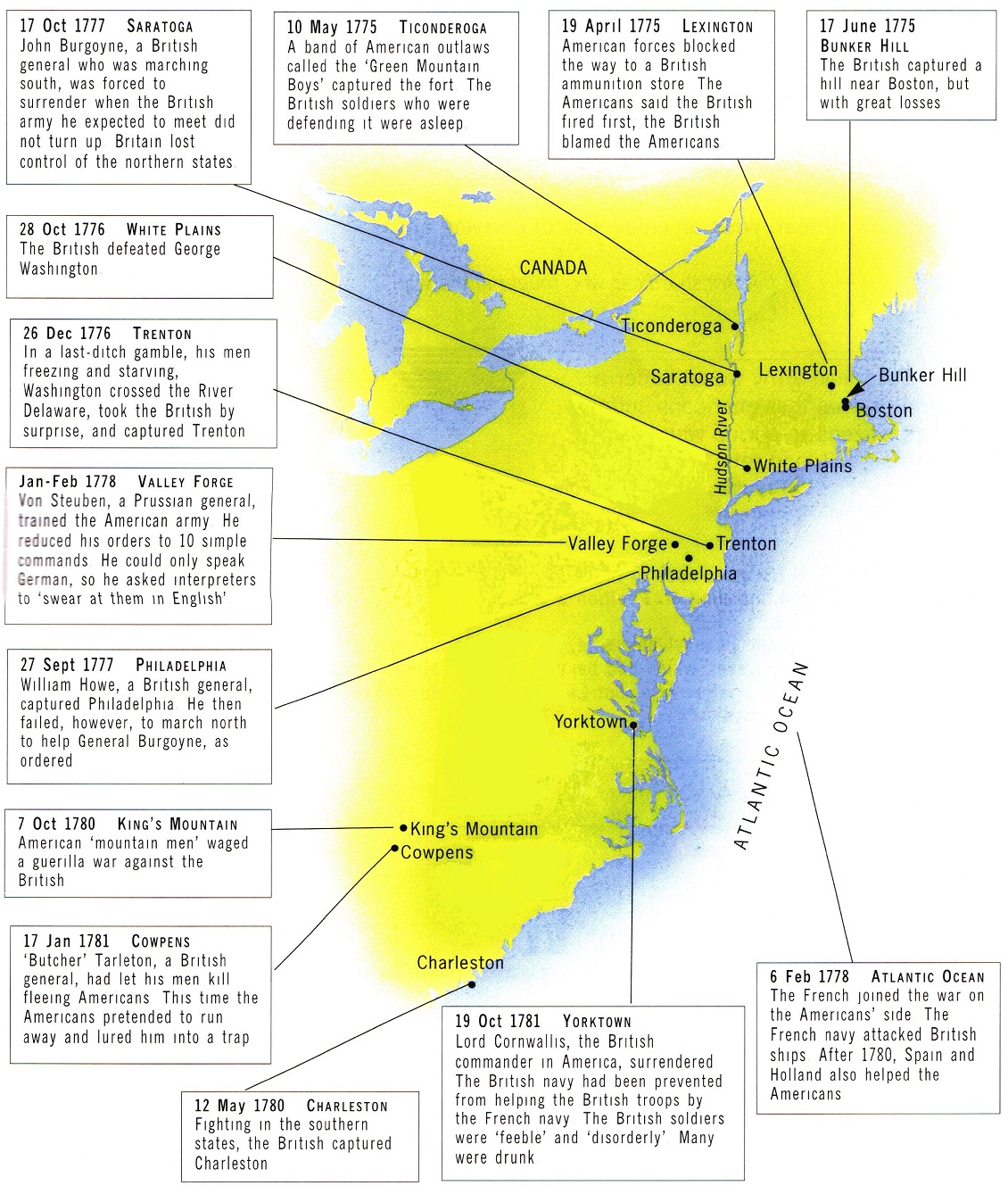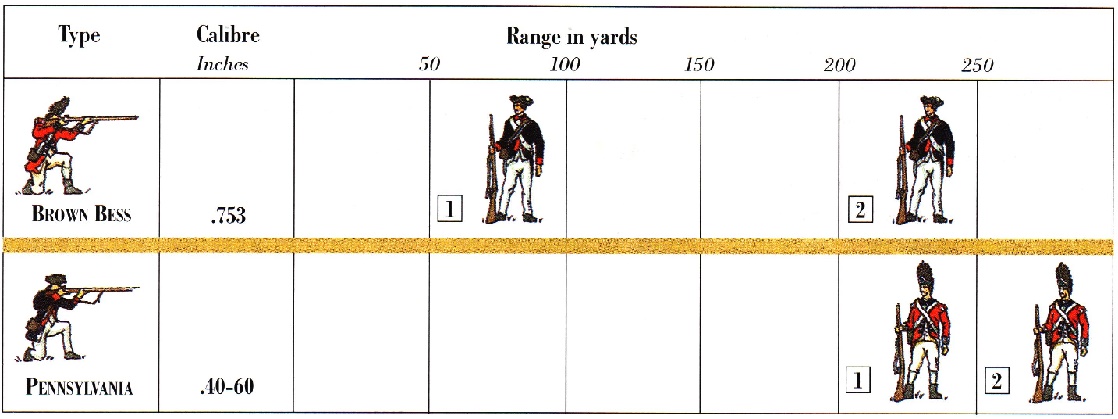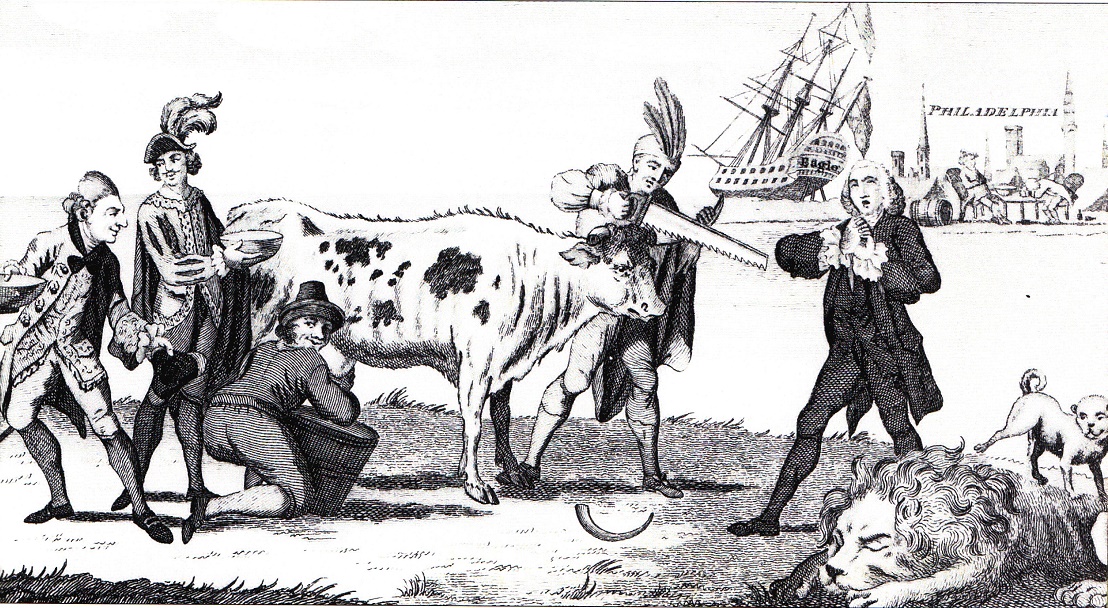
The American War of Independence

Introduction
In 1783, the Bntish Empire suffered a setback when the 13 American colonies fought and won the War of Independence. The conflict arose because the Bntish government thought that the American colonists ought to help pay for the wars against France, which had been very costly. It tried to make them pay customs duties on paint, paper, glass and tea. The colonists did not want to pay
On 16 December 1773, therefore, a group of American colonists dressed up as American Indians. They boarded Bntish ships in Boston harbour and threw their cargo of tea into the sea (the 'Boston Tea Party'). On 5 September 1774, the American leaders met in Philadelphia and decided to resist the Bntish government.
In the war that followed, the Americans, led by George Washington and helped by the French, defeated the Bntish. In 1783, Bntain was forced to accept the independence of the United States.
After you have studied this webpage, answer the question sheet by clicking on the 'Time to Work' icon at the top of the page.
Links:
The following websites will help you research further:
The American War of
Independence:
•
A simple narrative on YouTube
1 An American song of 1773
There was an old lady lived over the sea,
And she was an Island Queen,
Her daughter lived off in a new country,
With an ocean of water
between.
The old lady's pockets were full of gold,
And never
contented was she,
So she called on her daughter to pay her a tax
Of
three pence a pound on her tea
Revolutionary Tea:
Interrogating the song:
Explain: •
who was the 'old lady'/ 'Island Queen'? •
who was 'her daughter'?
•
what was the 'new country'?
•
what did the 'old lady's pockets' denote?
•
what was the tax she called on her daughter pay? •
what is the tone of the song?
Click here for the interpretation
2 The Declaration of Independence
This was written by one of the five leading revolutionary representatives, Thomas Jefferson, and agreed by th American Congress on 4 July 1776.
We hold these truths to be self-evident, that all men are created equal, that they are endowed by their Creator with certain unalienable rights, that among these are Life, Liberty and the Pursuit of Happiness...
That whenever any Government becomes destructive of these ends, it is the Right of the People to alter or abolish it...
Interrogating the Declaration:
Explain: •
'self evident'? • 'endowed by their Creator'?
•
'unalienable rights'?
• 'whenever any Government becomes destructive of these
ends'? •
'the Right of the People to alter or abolish it'? •
what is the tone of the Declaration?
Click here for the interpretation
3 Unlucky Thirteen – the events of the war

Introduction (continued)
Historians have suggested many reasons why Britain lost the American War of Independence. The following sources will help you form your own opinion.
This comment was written by a British officer who fought in the war.
Never had the British army so ungenerous an enemy. They send their riflemen 5 or 6 at a time, who hide themselves behind trees, till an opportunity presents itself of taking a shot at our men. Then they immediately retreat. What an unfair way of carrying on a war.
This was qritten by Lafayette, a French aristocrat and military officer who fought with the Americans during the war.
No European army would suffer a fraction of what the Americans suffer.
It takes citizens to put up with hunger, nakedness, toil, and total lack of pay.
The firing range of the guns used in the war:
• Position 1 shows the distance at which a soldier could expect to hit what he was aiming at.
• Position 2 shows the maximum distance at which the gun might wound an enemy soldier.
Many Americans used the Pennsylvania rifle, made by German gunsmiths in North America. Most British soldiers used the 'Brown Bess', which had been invented in about 1700.
A Scottish soldier, Patrick Ferguson, had developed a better rifle, but General Howe refused permission for it to be used, because Ferguson had not asked him first.

In this cartoon of the time, the cow stands for the British Empire, the lion for the British people, the warship for the British navy and the dog for troublemakers in Britain.
The cartoon shows the Americans cutting the horns from the cow, while France, Spain and Holland steal her milk. Meanwhile, the British lion sleeps, ignoring both the dog and the man begging it to wake up. In the background, the British warship – without guns or rudder – has run aground.

This comment was written by King George III of England – the king who lost the American colonies.
We meant well to the Americans – just to punish them with a few bloody noses, and then to make laws for the happiness of both countries. But lack of discipline got into the army, lack of skill and energy in the navy, and lack of unity at home. We lost America.